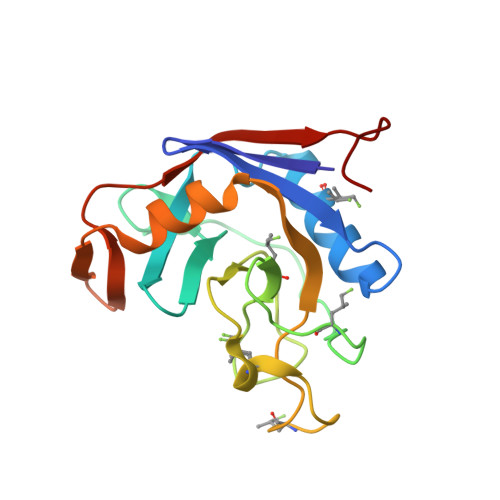Conformational Preferences of the Non-Canonical Amino Acids (2 S ,4 S )-5-Fluoroleucine, (2 S ,4 R )-5-Fluoroleucine, and 5,5'-Difluoroleucine in a Protein.
Frkic, R.L., Tan, Y.J., Abdelkader, E.H., Maleckis, A., Tarcoveanu, E., Nitsche, C., Otting, G., Jackson, C.J.(2024) Biochemistry 63: 1388-1394
- PubMed: 38742763
- DOI: https://doi.org/10.1021/acs.biochem.4c00081
- Primary Citation of Related Structures:
8VRG, 8VRH, 8VRI - PubMed Abstract:
Proteins produced with leucine analogues, where CH 2 F groups substitute specific methyl groups, can readily be probed by 19 F NMR spectroscopy. As CF and CH groups are similar in hydrophobicity and size, fluorinated leucines are expected to cause minimal structural perturbation, but the impact of fluorine on the rotational freedom of CH 2 F groups is unclear. We present high-resolution crystal structures of Escherichia coli peptidyl-prolyl cis - trans isomerase B (PpiB) prepared with uniform high-level substitution of leucine by (2 S ,4 S )-5-fluoroleucine, (2 S ,4 R )-5-fluoroleucine, or 5,5'-difluoroleucine. Apart from the fluorinated leucine residues, the structures show complete structural conservation of the protein backbone and the amino acid side chains except for a single isoleucine side chain located next to a fluorine atom in the hydrophobic core of the protein. The carbon skeletons of the fluorinated leucine side chains are also mostly conserved. The CH 2 F groups show a strong preference for staggered rotamers and often appear locked into single rotamers. Substitution of leucine CH 3 groups for CH 2 F groups is thus readily tolerated in the three-dimensional (3D) structure of a protein, and the rotation of CH 2 F groups can be halted at cryogenic temperatures.
Organizational Affiliation:
ARC Centre of Excellence for Innovations in Peptide & Protein Science, Research School of Chemistry, Australian National University, Canberra, ACT 2601, Australia.















